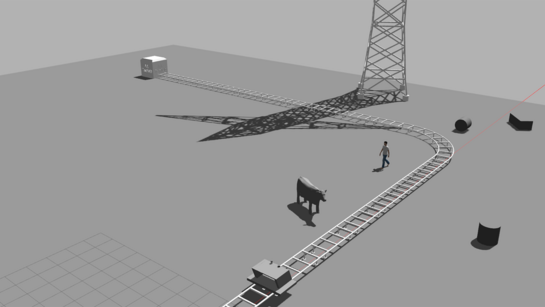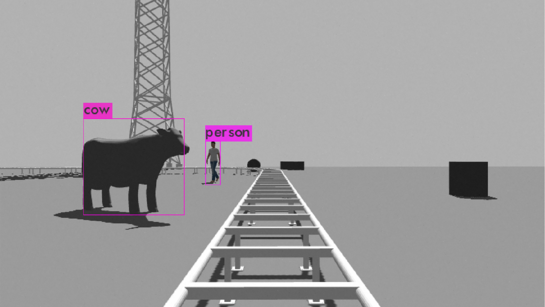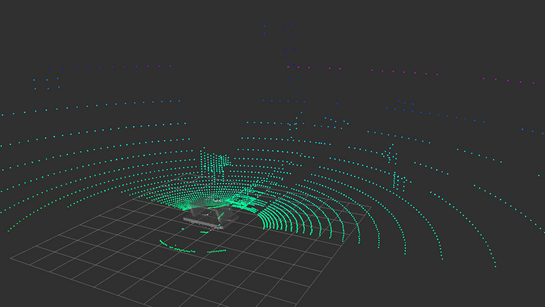Work processes in agriculture are characterized by high variability of ambient conditions: machines in the field are confronted with extreme influences such as rain, dust, and backlight, as well as a wide variety of plant and soil characteristics. Despite these harsh and uncertain surroundings for the technical devices, reliable object detection must be ensured—a necessary building block for goal-oriented action. On a scientific level, many methods for semantic environment perception exist in the field, but so far, they have not been validated and optimized against the background of these specific requirements. In the joint project AI-TEST-FIELD, funded by the German Federal Ministry of Food and Agriculture (BMEL), the partners Osnabrück University of Applied Sciences, LEMKEN GmbH & Co. KG, and Maschinenfabrik Bernard Krone GmbH & Co. KG, led by the DFKI research department Plan-Based Robot Control, are testing how a high degree of reliability can be achieved in sensor data evaluation. The project thus bridges a gap, transferring the state of basic research to the practical needs of the agricultural industry and initiating future certification processes.
A high-tech test environment on farmland
Prof. Dr. Joachim Hertzberg, head of DFKI Laboratory Niedersachsen and of the Plan-Based Robot Control research department: "Farmers are entrepreneurs who have always depended on optimizing their processes—artificial intelligence is an optimal tool for this. For us, it is important to engage in projects that are close to real life. With the results of AI-TEST-FIELD, namely, with optimized and verified in-field sensor data evaluation, AI-based support systems will become safer and thus more suited for application in farm work. Especially in a country like Germany, which sets a very high bar when it comes to approving these systems for practical use, our findings will be beneficial for adopting AI technology in farming.“
On the test field to be set up, the surroundings with the various agricultural conditions are to be recorded using a carrier vehicle equipped with different types of sensor technology (such as a laser scanner, a stereo camera, a time-of-flight camera, ultrasound, and radar). It is guided accurately and reproducibly along a track course through the test field. Together with the metadata of the collections, such as weather conditions or time of day, the raw data provides the necessary database for a control based on algorithms. The experimental environment is embedded in a larger software framework that will be connected to the IT infrastructure developed in another running project, Agri-Gaia. Later, the machine-independent algorithms that were generated and are found suitable for use will be transferred from the test field to real agricultural machinery and then evaluated. The DFKI research department Plan-Based Robot Control is primarily concerned with data handling and developing AI methods in the project. The Osnabrück University of Applied Sciences is responsible for building the rail-based sensor carrier and integrating the sensor technology. The agricultural technology companies LEMKEN and KRONE are contributing their domain knowledge concerning the industrial use of sensor systems and agricultural equipment. The project is accompanied and supported by TÜV Nord AG.
DFKI continues agricultural focus
The AI-TEST-FIELD project (funding number: 28DK101A20), part of the funding line “Bekanntmachung zur Förderung der Künstlichen Intelligenz (KI) in der Landwirtschaft, der Lebensmittelkette, der gesundheitlichen Ernährung und den Ländlichen Räumen im Rahmen von Forschungsvorhaben”, funded by the BMEL with nearly two million euros over three years, started on January 1, 2021. It runs in parallel to the large-scale project Agri-Gaia, funded by the Federal Ministry for Economic Affairs and Energy (BMWi), which started at the beginning of 2021 and in which DFKI is the leading partner, too. Agri-Gaia builds on the European cloud initiative GAIA-X and aims at creating an ecosystem for AI application in agriculture. There will be knowledge exchange between the two projects in the area of data and infrastructure.
About DFKI Laboratory Niedersachsen:
The DFKI Laboratory Niedersachsen was founded in 2019 and consists of the research departments Plan-Based Robot Control and Smart Enterprise Engineering in Osnabrück, as well as Marine Perception and Interactive Machine Learning in Oldenburg. The joint research topic is the comprehensive perception of complex environments by autonomous systems, based on data. Whether in the marine economy, agriculture, or production, DFKI researchers collaborate with strong partners from the region in application-oriented projects—in line with DFKI‘s motto to create "Human Centric AI".
About DFKI:
The German Research Center for Artificial Intelligence GmbH (DFKI) was founded in 1988 as a non-profit public-private partnership. It maintains research facilities in Kaiserslautern, Saarbrücken, Bremen, a project office in Berlin, a laboratory in Niedersachsen, and branch offices in St. Wendel, Trier, and Lübeck. DFKI is Germany's leading research center in the field of innovative commercial software technology using Artificial Intelligence and is one of the most important "Centers of Excellence" in the world. Its projects address the entire spectrum from application-oriented basic research to market- and customer-oriented development of product functions.



